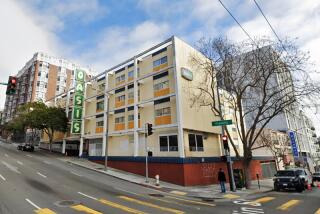Zoe Study Reports Shelter Site Is Free of Contamination
- Share via
Zoe Christian Center officials released an environmental report Friday that says the homeless shelter’s site is free of contamination and urged city officials to lift bureaucratic roadblocks that have stymied the shelter’s funding for years.
The report, by Hasan & Associates of Oxnard, concludes that “it is unlikely that there are hazardous materials or waste present” on the property.
Consultant Mohammed Hasan, a former Oxnard utilities superintendent, wrote that the presence of nearby chemical storage tanks could be mitigated by installing a public address system in the shelter to warn about toxic spills.
“Everything can be mitigated,” he said.
Hasan said a full environmental study was unnecessary, but that further study of nearby toxic sites could be beneficial.
Zoe has been operating without a permit since an Oxnard Fire Department report called the site unsafe because it was near the chemical storage tanks, which contain hazardous materials.
Zoe officials said they hope that the city will grant an operating permit without requiring a full-blown environmental study, which would be costly and time-consuming.
They said the shelter stands to lose close to $1 million in funding if the permit, which was revoked in 1988, is not renewed by June 1.
The Zoe shelter, Ventura County’s largest year-round homeless facility, houses an average of 130 people a night, mostly families and single women, in what used to be a farm labor camp at Rose Avenue and 5th Street.
On Friday, Zoe officials said they knew that their site was safe all along and that the environmental report vindicates their beliefs.
Fred Judy, a co-founder of Zoe, said the city was racially motivated in revoking the shelter’s operation.
“The basic problem is that some people on the City Council don’t want to see black people handling a lot of money,” said Judy, who is black.
Mayor Nao Takasugi denied that charge.
“I’m a minority person and have suffered some painful experiences of discrimination. I could never do that,” he said.
In 1990, Takasugi set up a task force with representatives of other cities to look into building an alternative shelter to Zoe.
But the other cities’ representatives soon dropped out.
The Oxnard City Council then hired a consultant to come up with a list of alternative loca-tions.
The top four sites selected were in the Latino, working-class La Colonia neighborhood.
But residents of La Colonia made it clear to city officials that they would not welcome the site, and that effort also was abandoned.
Zoe officials estimate that they have lost about $2 million in federal, state and local grants the past three years because the city refused to issue a permit for the Rose Avenue site.
Finally, in December, the Oxnard City Council agreed to what Zoe officials had asked all along: to find out if it is possible to stay permanently at their present site.
Councilwoman Dorothy Maron, who has long supported Zoe’s efforts to stay at Rose Avenue,said the homeless people at the shelter have been victimized by political maneuvering on the City Council.
“Nobody complained when farm workers lived there. The toxics appeared when Zoe moved in,” she said.
A spokesman for the Fire Department declined to comment.
Takasugi said: “Too bad. Sometimes we try to do things in hopes of aiding the homeless situation, and somehow you are perceived to be setting up roadblocks.”
More to Read
Sign up for Essential California
The most important California stories and recommendations in your inbox every morning.
You may occasionally receive promotional content from the Los Angeles Times.













